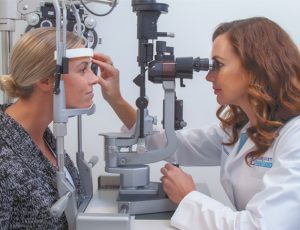Elmquist Eye Group recommends annual eye exams for optimal eye health
 August is National Eye Exam Month, a timely reminder to schedule your annual eye exam.
August is National Eye Exam Month, a timely reminder to schedule your annual eye exam.
Eye exams are essential for maintaining eye health – even if you haven’t had a noticeable decline in vision or an eye injury. Yet, according to the National Eye Institute, more than 23 million Americans aged 18 and older have never had an eye exam.
“Eye exams provide an opportunity for your eye doctor to take an in-depth look inside your eye,” said Dr. Trevor Elmquist, founder of Elmquist Eye Group. “For optimal eye health, we recommend patients schedule an annual exam to evaluate for subtle forms of vision loss and other serious eye health conditions.”
Sharpen your vision
Changes in vision can cause symptoms such as headaches, eye fatigue, squinting and blurry vision.
Our eyes naturally change as we age, and therefore, a year-old prescription is likely not fulfilling your vision needs. A refraction, or vision test, is routinely given during an eye examination to tell your doctor if you need a new or updated prescription.
Refractive errors including farsightedness and nearsightedness can be diminished with corrective lenses. In addition to eyeglasses and contact lenses, several lens options such as bifocals, trifocals and progressive lenses are designed to address age-
related vision problems, as well as special lenses for other conditions like astigmatism. An eye exam provides an opportune time to speak with your eye doctor about what type of corrective lenses are best for your lifestyle and vision needs.
Promote healthy vision for a lifetime
Healthy vision should remain a priority from childhood through your senior years. Vision screenings for children are important as the body develops, while exams throughout adulthood provide a baseline for detecting and treating conditions that occur with age.
Vision problems can often be corrected or avoided, yet without proactive care, subtle changes can easily go unnoticed.
There are several eye conditions beyond refractive errors like nearsightedness and farsightedness that affect your vision. Astigmatism, amblyopia or lazy eye, and temporary conditions including dry eye, eye strain, blurry vision caused by fluctuating blood sugar levels and hormonal changes with pregnancy can all result in vision changes.
Regular exams help ensure you are seeing at your best and allow your eye doctor to review additional healthy lifestyle habits for eye health, such as vitamin-rich foods, dietary supplements, preventing sun overexposure and more.
Early detection is key
Early detection is critical for the timely treatment of many vision-threatening eye conditions. When caught early, symptoms can often be managed with lifestyle changes and medication, while surgery may be required for more advanced cases.
Common vision-threatening eye conditions include:
• Glaucoma: A disease of the optic nerve, commonly associated with high eye pressures.
• Age-related macular degeneration: The leading cause of irreversible vision loss among the elderly, causing loss of central vision.
• Cataracts: Clouding of the normally clear lens of the eye, making things look blurry, hazy or less colorful.
• Diabetic retinopathy: Decreased vision when blood-sugar levels damage blood vessels within the retina.
• Ocular melanoma: A common cancer that can impact the uvea in the middle layer of the eye, the conjunctiva near the front of the eye or the tissues surrounding the eye.
Types of eye exams
A vision screening alone does not take the place of a comprehensive eye exam. Your exam should include:
• A visual acuity test with an eye chart to test how well you see at various distances.
• A tonometry to measure the pressure inside the eye.
• An eye muscle test to evaluate muscle function.
• A pupil response test to monitor how your pupils respond to light.
• A dilated exam, which places drops in your eyes to widen, or dilate, the pupils. Your eye care professional uses a special magnifying lens to examine your retina and optic nerve for signs of damage and other eye problems.
“Vision impairment and blindness can seriously impact your quality of life,” said Dr. Kate Wagner, board-certified optometrist and managing partner at Elmquist Eye Group. “Taking control of your eye health now will help make sure you can see well into the future.”
Choose to be proactive in maintaining the overall health of your eyes. To schedule an eye exam, contact Elmquist Eye Group’s team of highly skilled associates.
With more than 25 years of service to the Southwest Florida community, Elmquist Eye Group offers experienced doctors who are dedicated to patient care. Dr. E. Trevor Elmquist, Dr. Kate Wagner, Dr. Sarah Eccles-Brown, Dr. Nina Burt and Dr. Yasaira Rodriguez of Elmquist Eye Group are available to answer your questions. With three U.S. military veterans leading the practice, Elmquist Eye Group’s team stands ready to serve you right here in Southwest Florida. For more information, visit www.Elmquist.com, call 239-936-2020 or schedule an appointment at an Optical Boutique location in Fort Myers or Cape Coral.
Elmquist Eye Group
FORT MYERS
7970 Summerlin Lakes Dr.
CAPE CORAL
2336 Surfside Blvd., Suite 121
239-936-2020






